|
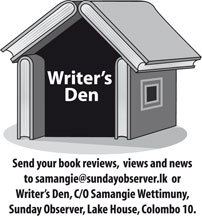
Overall celebration of humaneness
Reviewed by Padma Edirisinghe
"Learning from Life" Rukmani Samaranayake
could easily be taken as a title of one of those umpteen books that
market education these days not only in book shops but even on
pavements. One only wishes that the writer opted for a more innovative
and uncommon title for her collection of short stories.
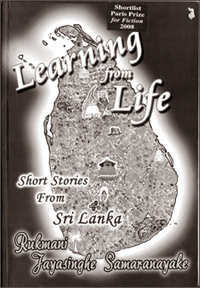 A book title can be as important as the book itself. The reviewer
remembers Cyril Perera, the prolific translator, mourning that his
translation of Charles Dicken's "Christmas Carol" earned meagre
readership since the title Nattal Geethaya prevented would be readers,
mostly Buddhists from purchasing it under the delusion that it was a
conversion snare perpetrated by the Vatican. Actually the miserly
Scrooge who later reforms himself is more akin to a character in
Buddhist literature, striving to fulfil the Dana Paramitha. A book title can be as important as the book itself. The reviewer
remembers Cyril Perera, the prolific translator, mourning that his
translation of Charles Dicken's "Christmas Carol" earned meagre
readership since the title Nattal Geethaya prevented would be readers,
mostly Buddhists from purchasing it under the delusion that it was a
conversion snare perpetrated by the Vatican. Actually the miserly
Scrooge who later reforms himself is more akin to a character in
Buddhist literature, striving to fulfil the Dana Paramitha.
Coming back to "Learning from Life" its author is an educationalist
cum successful writer. Her books "Good bye Zinto" and "Achchiamma's
promise" have won State Literary awards. She has also done a series in
English to develop the language creativity of schoolchildren.
This book takes a different path where memorable scenes from her long
life's journey are woven into vibrant literary pieces. The
Educationalist in her (as a member of University staff) makes each a
carrier of a salutary message that may or may not detract that literary
value of each. The message transmitting is more or less entrenched in
our indigenous literature and Rukmani is perhaps only sticking to the
traditions.
It is clear that the author has had a taste of both urban life as
well as rural life and hence creeps into the nooks and crannies of each
with her pen, cutting across as a wide spectrum of subjects as
alcoholism, plight of migrant female workers and even murder most foul,
the last based on a true incident. Here is a quote from the Foreword
itself.
'An overall celebration of humaneness pervades the narratives which
even in their most violent, morbid and tragic outcomes are encompassed
by a writing style that is infused with tinges of humour, satire and
comedy as transpired in "Murder most foul". Strangely the foreword has
been written by a student of the author that demonstrates the humility
of Rukmani. However my own favourite story is "Elisabeth and Charlis -
1915", a cross between history and biography for Elisabeth and Charlis
are the author's grand parents embroiled in the 1915 Riots. The actual
historical details, the author admits have been culled from "Hundred
days under Martial Law in Ceylon in 1915" by Mr. Armand de Souza, editor
of the Ceylon Morning Leader. These incidents spring to life via the
story told by the author. It is a cue that young writers could take up.
Armand de Souza himself earns this tribute from the author, "A
Goanese Indian by birth, he had the humanitarian concern and the courage
to address the imperial authorities at the height of their power, to
seek justice for a people who were not his own".
The ramifications of a writer's mind know no bound, which truth is
empty illustrated by this work.
Analysis of judicial review of Bills
Reviewed by L.I. Keerthisinghe LLB, LLM
Attorney-at-Law
Methsiri Cooray in this book, which is a revised and an updated
version of the dissertation submitted to the University of Colombo in
partial fulfillment of the course work required for the award of the
Master's Degree in Law, traces the history and engages in a
constitutional analysis of the concept of pre-enactment judicial review
of Bills presented in the Parliament of Sri Lanka.
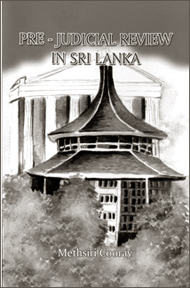 The Supreme Court of Sri Lanka, under Article 120 is vested with the
exclusive judicial review to examine the consistency of such Bills with
the provisions in the 1978 Constitution of Sri Lanka. The relevant
Constitutional provisions are examined in Chapter 1 as an introduction
to the discussion. While Article 121 provides for pre-enactment judicial
review for unconstitutionality to be challenged within one week of the
Bill being placed in the Order Paper of Parliament, Article 122 spells
out the procedure for review of Bills certified as urgent in the
national interest by the Cabinet of Ministers. Questions relevant to the
discussion have been raised in the introductory Chapter, the answers to
which are found in the concluding chapter. Chapters II to IV deal with
the historical aspects commencing from the time of the ancient Sinhala
Kings up to the enactment of the first Republican Constitution of 1972
and the establishment of the Constitutional Court. The Supreme Court of Sri Lanka, under Article 120 is vested with the
exclusive judicial review to examine the consistency of such Bills with
the provisions in the 1978 Constitution of Sri Lanka. The relevant
Constitutional provisions are examined in Chapter 1 as an introduction
to the discussion. While Article 121 provides for pre-enactment judicial
review for unconstitutionality to be challenged within one week of the
Bill being placed in the Order Paper of Parliament, Article 122 spells
out the procedure for review of Bills certified as urgent in the
national interest by the Cabinet of Ministers. Questions relevant to the
discussion have been raised in the introductory Chapter, the answers to
which are found in the concluding chapter. Chapters II to IV deal with
the historical aspects commencing from the time of the ancient Sinhala
Kings up to the enactment of the first Republican Constitution of 1972
and the establishment of the Constitutional Court.
The significance of the period during 1978 to 1994 subsequent to the
enactment of the second Republican Constitution of 1978 is discussed in
detail in Chapter V. The challenges to the Bills presented during that
period have been discussed comprehensively and the findings of the
Supreme Court in each case have been analyzed. The comments made by the
Supreme Court on the inadequacy of the time limit of one week for a
citizen to petition the Court regarding the unconstitutionality of a
Bill, the deliberate withholding of the Gazette Notification containing
the draft bill from the public in some instances, the by passing of even
the limited time frame in the case of bills certified as urgent and the
short time granted to the Court to arrive at a decision which enables
only a cursory examination to be made indicate the shortcomings in the
pre-enactment judicial review process provided for in the 1978
Constitution. It is preferable that the said drawbacks should be
remedied either by an amendment to the present Constitution or in the
enactment of a revised Constitution resulting in the guaranteeing of the
sovereignty of the People of Sri Lanka. The author states in the
concluding chapter that the Supreme Court has played a significant role
during the period 1978 in pre-enactment judicial review, although in a
restricted sense.
The author quite rightly points out that due to the restriction
placed by the provisions in the present Constitution, the Supreme Court
cannot be blamed for the said position. As post enactment judicial
review has been barred by Article 80(3) of the Constitution it is
advisable to remove the severe restrictions placed on pre-enactment
judicial review so as to enable a more comprehensive analysis to be made
by the Supreme Court on the constitutionality of a Bill before such
enactment.
As Sir Granville Rarn stated 'A Bill is forged on the anvil of the
draftsman's table, while politicians and civil servants swing their
heavy sledges.'
This may be true in the United Kingdom where judicial review of
legislation is not permitted but in the United States the limitations
placed on such judicial review is minimal or non-existent. In Sri Lanka,
the position is in between the said two extremes. Relevant case law has
been referred to in the text, among them significant Sri Lankan cases
such as Queen vs Liyanage (1965) 68 NLR 265 Bribery Commissioner vs.
Ranasinghe (1964) 66 NLR 78 and Piyadasa vs. Bribery Commissioner (1962)
64 NLR 385 and significant decisions both in the UK and USA have been
referred to. As pointed out by the author there is a paucity of
publications dealing with the subject area of his research.
Thus there is a lack of footnotes and the literature survey is brief.
Hon. Saleem Marsoof Judge of the Supreme Court in his inaugural K.C.
Kamalasabeyson PC oration delivered on 25 August 2008, available on the
internet, subsequent to the publication of Mr. Cooray's book, makes some
valuable comments on the subject area of pre-enactment judicial review.
Justice D. Jagath de S. Balapatabendi who wrote the foreword and Dr.
Sunil F.A. Cooray who wrote the Introductory Note, make some valuable
comments on the subject of pre-enactment judicial review.
The book is eminently readable and provides a comprehensive and lucid
overview of the pre-enactment judicial review process presently adopted
in Sri Lanka. Mr. Cooray's book would undoubtedly be of immense value to
students and teachers of the Law as well as legal practitioners and
judges.
The general public who wish to be informed of the constitutional
provisions and the procedure to invoke pre-enactment judicial review
would greatly benefit by perusing the book.
Foundations in Language Learning
'Foundations in Language Learning' by Dr. Neelakshi Chandrasena
Premawardhena is the result of extensive research conducted by the
author locally and abroad, and experience gathered during two decades of
teaching German as a Foreign Language, English as a Second Language and
Linguistics.
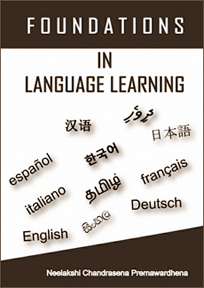 A background knowledge of Linguistics, functions of language,
intercultural communication and an insight into language, culture and
society provide one with a firm foundation to embark on effective
language teaching and learning. A background knowledge of Linguistics, functions of language,
intercultural communication and an insight into language, culture and
society provide one with a firm foundation to embark on effective
language teaching and learning.
Despite numerous works on second and foreign language teaching being
available today, there is a dearth of work related to Sri Lanka where
our own learning traditions and culture as well as learner difficulties
are in focus.
Thus this book was written obliging many requests from students of
foreign languages at the Department of Modern Languages and MA in
Linguistics, University of Kelaniya, and participants of numerous
teacher training sessions, guest lectures and international conferences.
The emphasis here is more on practical aspects than on theory with an
aim to provide useful hints to understand our learners better and design
language lessons for more effective results. All topics related to
language and language teaching discussed in this work are supported by
authentic examples from local sources. Contents of the book are as
follows: Functions of Language,Verbal and Non-verbal Communication,
Human Communication, Animal Communication,Introduction to Linguistics,
Language and Culture, Intercultural Communication, Unique Features of
Languages, Universal Features of Languages, Aspects of Language
Teaching, Second and Foreign Language Acquisition, Testing and
Measurement, Effective Language Teaching and Interactive Computer Aided
Language Learning.
Dr. Neelakshi Chandrasena Premawardhena is a Senior Lecturer in
German at the University of Kelaniya, Sri Lanka. She was the Head of
Department of Modern Languages, University of Kelaniya from 2002-2007.
Dr. Premawardhena obtained her BA(Hons) in Linguistics and German and
an MPhil in Linguistics from University of Kelaniya and a PhD in German
Studies from University Siegen, Germany. She is privileged to be the
first and only Sri Lankan to date to have earned a PhD in Germanistik
from a German university. She is also a holder of the Diploma in
Teaching German as a Foreign Language (Deutschlehrerdiplom), Goethe
Institut, Munich.
Dr. Premawardhena has a wide range of research interests including
contrastive linguistics, historical linguistics, corpus linguistics,
foreign and second language teaching, intercultural communication,
language typology and discourse analysis. She has published several
books and over 30 research papers in German and English, and her
research articles have appeared in many international publications
including the Dialogue Studies series by John Benjamins, Amsterdam.
She is engaged in collaborative research with several German
universities, being regularly invited as a visiting scholar and guest
speaker at Universities of Siegen, Stuttgart and Ludwig Maximilian
University Munich.
The loom and the weaver
Reviewed by Carl Muller
Ransiri Menike de Silva who won the State Literary Award in 2007 for
her debut collection of short stories needs little introduction. She
stars in a family of writers and her firmament has given her all the
space for her streaming creativity to nourish her readers. with her new
book before me, I see a sort of restless narrative drive and an intimacy
in approach.
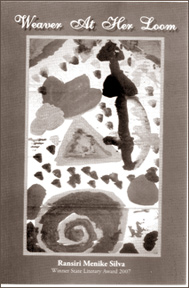 Ten stories in 85 pages show us how well she can encapsulate her many
themes and avoid stuttering over happenings. Each object must be
sensibly patterned and with no over-enthusiastic mush that can become a
deadly foe of accuracy. Her talent really hits a target so many have as
yet to see and she does not give opinions. She writes the way Wordwsorth
said of writers that in proportion to being good, or great, or original,
they must create in themselves the taste by which their writing can be
relished. Ten stories in 85 pages show us how well she can encapsulate her many
themes and avoid stuttering over happenings. Each object must be
sensibly patterned and with no over-enthusiastic mush that can become a
deadly foe of accuracy. Her talent really hits a target so many have as
yet to see and she does not give opinions. She writes the way Wordwsorth
said of writers that in proportion to being good, or great, or original,
they must create in themselves the taste by which their writing can be
relished.
With all this off my chest, we shall look at 'Weaver at her loom'.
This is not the title of any of the stories in this collection but we
see how well it has been picked. The writer is the weaver. She is at her
loom and out of it come the colours, the affections, the designs, the
inward checking to augment the number of her ideas....and not just the
spinning of rhetoric but each weave to mark the course of her
characters, be it the little girl who loves her kindly rickshaw-man
('Love pp 18) and the little Dhammika who sees a murder recreated before
her terror-stricken eyes ('A Headline Story' pp 9-20). Ransiri had
transported this story from Scandinavia, placing it on her loom just as
it had happened so far away.
Death in any form needs to be understood. Didn't Philip Larkin say
that Death is no different whether you whine at it or withstand it?
Culture has to shift across the warp and woof as well as character, be
it high or low.
This is where her third story has scored so well. Such a giddy,
self-important bunch to be sure - the kind who like to spend money they
don't have on the things they don't want in order to impress people they
don't like. Stupidity also has a knack of getting in the way and the
so-called commonsense becomes a collection of prejudices, gushing voices
drowning the music of saner opinion. This is a fun-story but woven
artfully and with no holds barred ('Polato Couch and other Tales' pp
21-24)
As you read, you will find nothing contrived. Indeed, Ransiri has
assured the reader of her responsibility for what is digested. The
stories flow out of her world not because she looks for fame in her
accomplishment but because she wants readers to know that she had them
in mind. After all, she remains the instrument - the loom, if you wish
it to be - that you must also use. It is not a deity, not some Gorgon
with a Medusa head, or some Cyclopian tyrant. It is simply a beautiful
bond between reader and writer.
I need to leave the rest of the story-weaves to you. After all, what
I have done so far is to give you an aperitif in order that you can look
forward to downing many more glasses of Ransiri's nectar. even Jonathan
Swift did not feel it of any necessity in maligning or dismissing the
work of a writer. "Whatever the book," he once said, "it is alive and
talking to me."
You will hear the voice from the loom, telling of the nest in the
garden and the nest a wife makes for herself...a terrorist who below
himself up to make a woman a hospital heroine...Shiromini's dream of a
grandiose ancestral home...It is all around you like a high breeze above
the grass, knowing how the grass will bend as it passes over it.
I can only agree with the many who have commented on this collection"
Anne Abeysekera, Chitra Ranawake, Tissa Jayatilleke, Gamini Seneviratne
and Jean Arasanayagam. Ransiri's is the 'seeing eye - her reflections,
thoughts, observations, situations, characters that ring so true.
Keep writing, Ransiri and let me dedicate these lines to you:
"When others will someday reminisce about you,
Tell stories of the things you did,
Recall something you once wrote,
Comment on your life in journals,
Publish the stories you left behind,
That is the sunlight of your life."
I give you the Canadian poet Raymond Fraser. No one I know can tell
me of him but how can I not recall his lines?
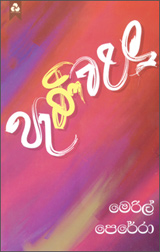 Peni Valalu Peni Valalu
Merryl Perera's latest book Peni Valalu will be launched at Gangarama
Vihara premises, Hunupitiya, Colombo 2, on December 15 at 4 pm.
The launching ceremony will be presided over by Ven. Galaboda
Gnanissara Thera, Viharadhipathi, Gangaramaya. Narada Nissanka will
compere the launching ceremony.
Merryl Perera is the author of 'Ayubovan Armour Veediya' 'Divayine
Visi Vasak' and 'Sebe Pattarakarayo'. 'Peni Valalu' is a Dayawansa
Jayakody publication.
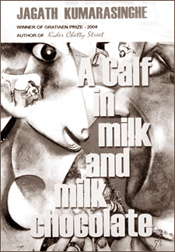 A calf in milk and milk chocolate A calf in milk and milk chocolate
Gratiaen prize winner Jagath Kumarasinghe's latest book "A calf in
milk and milk chocolate" will be launched at the National Library
Services and Documentation Board auditorium, No. 14 Independence Avenue,
Colombo 7 on December 15 at 4 pm.
The book is a Sooriya Publication. |

